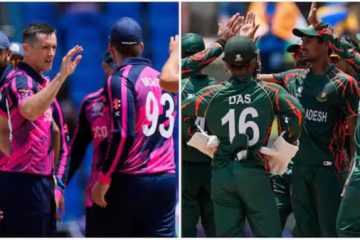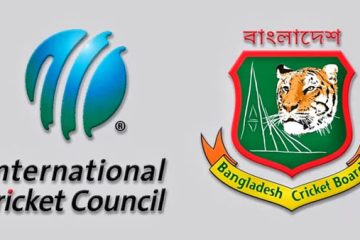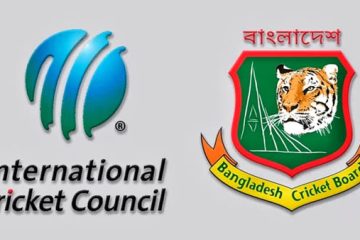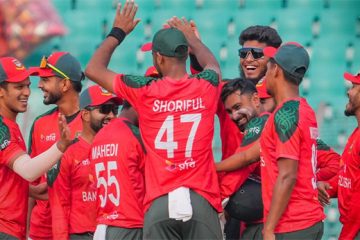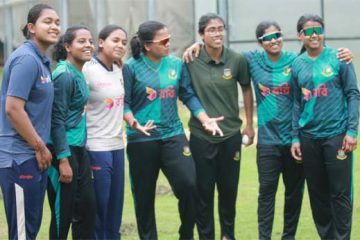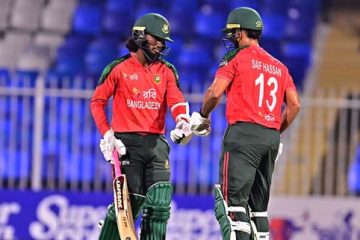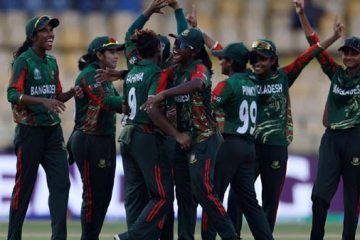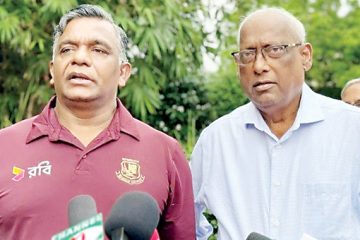The Bangladesh Cricket Board is content with the outcome of the International Cricket Council meeting in Singapore that saw the approval of a wide range of structural and governance reforms, a BCB official said on Saturday. Though the proposed changes in the comprehensive resolution relating to the governance, competition and financial models of the ICC has been widely-criticised for placing too much power in the hands of India, England and Australia, the BCB is pleased that the matter has been resolved.
‘We are happy that it all ended,’ BCB Media and Communication Committee chairman Jalal Younus told reporters at the Sher-e-Bangla National Stadium on Saturday.
We always stood firm with our decision about the entire issue and were the first country to oppose formally against accepting it in its entirety during the last meeting in Dubai,’ Jalal said.
‘Prior to the ICC meeting in Dubai, we were worried about losing our Test status due to the two-tier Test system, but the issue was settled in the first meeting. So, our Test status will be intact. We do not have to play in the two-tier system or even the Intercontinental Cup.’
The resolution that was passed also provided an opportunity for ICC Associate Members to make their claims for Test status.
‘Associate Members now have a clear pathway to playing Test cricket. The winner of the next ICC Intercontinental Cup will be entitled to take part in a play-off against the bottom-ranked Full Member and, if successful, obtain Test status,’ said an ICC press release sent immediately after the meeting.
‘This complements the pathways that are already in place for any Member to be able to qualify for the major events in ODI and T20I cricket.’
Although a few details, including the cut-off date to decide which Full Member will play in the play-off matches, need to be confirmed and approved by the ICC Board, the matches between the 10th Full Member and the Intercontinental Cup winners will be of five-day durations.
These matches will not be classified as Test matches as the Intercontinental Cup winner will not have Test status.
If the Intercontinental Cup winners win these matches, then there will be 11 Test-playing countries. The next Intercontinental Cup will be played between 2015 and 2017.
The package resolution includes setting up a five-man executive council with seats reserved for India, England and Australia, the sport’s leading financial powers.
South Africa, who had previously opposed the reforms that met with virulent opposition after they were debated at a board meeting in Dubai last month, voted in favour of the resolution.
The reforms passed on Saturday include setting up a Test Cricket Fund available to all full members except India, England and Australia, and a move to make it easier for other countries to gain Test status.
The proposed World Test Championship, which was due to debut in 2017, has been axed with the Champions Trophy – an eight-country tournament in the one-day format – continuing in 2017 and 2021.
And a new financial model will recognise members’ contributions in terms of finance, history and on-field performances – a move aimed at providing ‘long-term certainty of participation’ as they negotiate TV and sponsorship deals.
‘We had no matches with some countries in the present system, but with the finalization of the deal, there is an opportunity to play bilateral series. Now we need to talk with other boards to hold bilateral series,’ said Jalal.
‘IND, ENG and AUS have opened the doors for negotiation. Now we’ll negotiate with them so that we can play home or away bilateral series with them.’
-With New Age input





